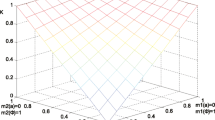Abstract
Updating or conditioning a body of evidence modeled within the DS framework plays an important role in most of Artificial Intelligence (AI) applications. Rule is one of the most important methods to represent knowledge in AI. The appearance of uncertain reasoning urges us to measure the belief of rule. Now, most of uncertain reasoning models represent the belief of rule by conditional probability. However, it has many limitations when standard conditional probability is used to measure the belief of expert system rule. In this paper, AI rule is modelled by conditional event and the belief of rule is measured by conditional event probability, then we use random conditional event to construct a new evidence updating method. It can overcome the drawback of the existed methods that the forms of focal sets influence updating result. Some examples are given to illustrate the effectiveness of the proposed method.
Similar content being viewed by others
References
E. C. Kulasekere, K. Premaratne, and D. A. Dewasurendra. Conditioning and updating evidence. Approximate Reasoning, 36(2004)1, 75–108.
G. Shafer and R. Logan. Implementing Dempster’s rule for hierarchical evidence. Artificial Intelligence, 33(1987)3, 271–298.
G. Shafer. Jeffrey’s rule of conditioning. Philosophy Science, 48(1981)9, 337–362.
P. Smets. The transferable belief model and random sets. IPMU: TBM-RS, 1992, 37–46.
D. Dubios and H. Prade. Upadting with belief function, ordinal conditional functions and possibility measures. Proceedings of the Sixth Annual Conference on Uncertainty in Artificial Intelligence, New York, July 27–29, 1990, 311–329.
H. Ichihashi and H. Tanaka. Jeffrey-like rules of conditioning for the Dempster-Shafer theory of evidence. Approximate Reasoning, 3(1989)2, 143–156.
Yongchuan Tang and Jiacheng Zhang. Genneralized Jeffrey’s rule of conditioning and evidence combining rule for a priori probabilistic knowledge in conditional evidence theory. Information Sciences, 176 (2006)11, 1590–1606.
K. Premaratne and D. A. Dewasurendra. Evidence combination in an environment with heterogeneous sources. IEEE Transactions on Systems, Man, and Cybernetics, 37(2007)3, 298–309.
K. Premaratne and D. A. Dewasurendra. Evidence updating in a heterogeneous sensor environment. Circuits and Systems, 4(2003)3, 824–827.
D. Lewis. Probabilities of conditionals andconditional probabilities. Philosophy Reviews, 85(1976)7, 297–315.
I. R. Goodman, R. Mahler and H. T. Nguyen. Mathematics of Data Fusion. Kluwer Academic Publishers, 1997, 345–379.
M. Spies. Conditional events, conditioning, and random sets. IEEE Transactions on Systems, Man, and Cybernetics, 24(1994)12, 1755–1763.
R. Mahler. Combining ambiguous evidence with respect to ambiguous a priori knowledge, Part I: Boolean Logic. IEEE Transactions on Systems, Man, and Cybernetics, 26(1996)1, 27–41.
Deng Yong, Liu Qi, and Shi Wenkang. A review on theory of conditional event algebra. Chinese Journal of Computers, 26(2003)6, 650–661 (in Chinese). 邓勇, 刘琪, 施文康. 条件事件代数研究综述. 计算机学报, 26(2003)6, 650–661.
Deng Yong and Shi Wenkang. GNW conditional event algebra and its application. Computer Engineering, 28(2002)1, 23–25 (in Chinese).. 邓勇, 施文康. GNW 条件事件代数的原理和应用. 计算机工程, 28(2002)1, 23–25.
I. R. Goodman, H. T. Nguyen, and E. A. Walker. Conditional inference and logic for intelligence systems. A Theory of Measure-Free Conditioning. 1991, 137–174.
R. Mahler. Combining ambiguous evidence with respect to ambiguous a priori knowledge, Part II: Fuzzy logic. Fuzzy Sets and Systems, 75(1995)1, 319–354.
Author information
Authors and Affiliations
Corresponding author
Additional information
Supported by the NSFC (No. 60772006, 60874105), the ZJNSF (Y1080422, R106745), and Aviation Science Foundation (20070511001).
Communication author: Wang Yingchang, born in 1981, male, postgraduate.
About this article
Cite this article
Wen, C., Wang, Y. & Xu, X. A new evidence updating rule based on conditional event. J. Electron.(China) 26, 731–737 (2009). https://doi.org/10.1007/s11767-009-0091-6
Received:
Revised:
Published:
Issue Date:
DOI: https://doi.org/10.1007/s11767-009-0091-6




